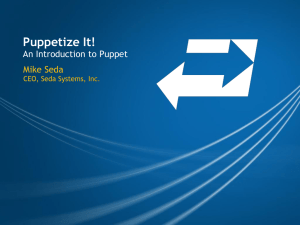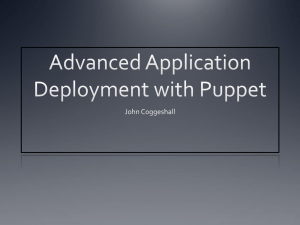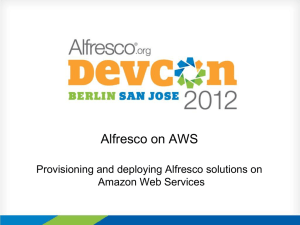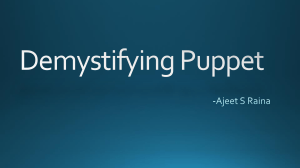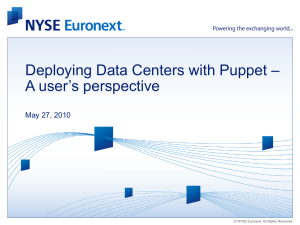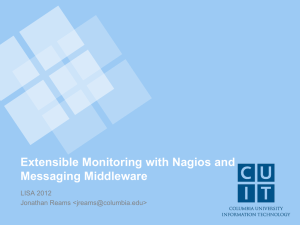PPTX
advertisement
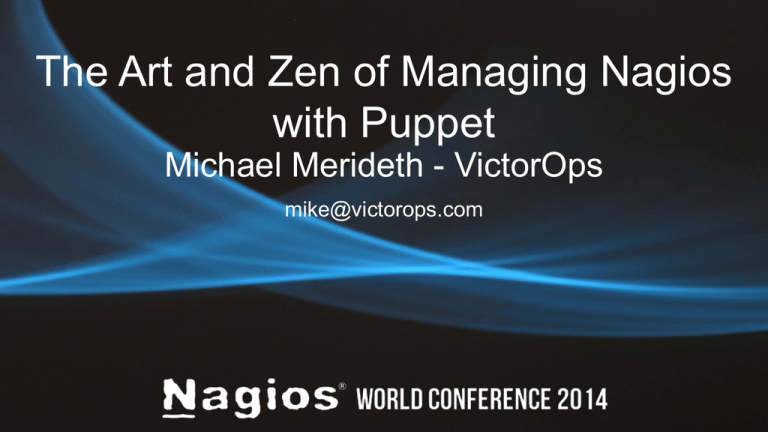
The Art and Zen of Managing Nagios
with Puppet
Michael Merideth - VictorOps
mike@victorops.com
Puppet and Nagios
• Why use config management?
• Using Puppet with Nagios:
•
•
•
•
Generating config
Data separation
Provisioning and de-provisioning
Monitoring Puppet
• Demo Time!
Why Config Management?
The age of virtualization
•
•
•
•
•
IT pros, even at startups, are managing hundreds
of nodes per person
There are simply too many running OSes for most
shops to manage manually
Config management solves the problems of drift
and inconsistency
Easy to rebuild, easy to back up
Config management becomes living documentation
DevOps and Config Management
DevOps from an IT perspective:
• Infrastructure as code
• SCM as an IT workflow tool
• Continuous integration
•
•
Unit testing
Integration testing
• Letting the developers into the sandbox
Key Puppet Features
• Exported Resources
• Hiera
• Inline Templates
• Facter
• Nagios Resource Types
• Puppet Forge
Key Puppet Features
Exported Resources:
• A resource gets defined on one host, and
implemented on another
• Requires the use of PuppetDB, which usually means a
Puppet Master
• Saves having to use shared storage or insecure file
transfers
• Keeps the number of configuration files low
Exported Resources
A resource gets defined on one host (web1.dev):
@@nagios_service { "${::hostname}.${::vo_env}-http":
check_command
=> 'check_http',
use
=> "${::vo_env}-service",
display_name
=> 'http port 80',
host_name
=> "${::fqdn}",
servicegroups
=> 'application-services',
service_description => "${::hostname}.${::vo_env}-http",
tag
=> "${::vo_env}-service",
}
And “collected” on another (nagios1.dev):
Nagios_service <<| tag == “${::vo_env}-service” |>>
Key Puppet Features
Hiera:
• Separate code from data
• Set defaults and provide overrides
• Encrypted back-ends mean security, even if your
source code is stolen
Key Puppet Features
Inline Templates:
• Not just for file content
• Allows the use of native
Ruby code within Puppet
policy
Key Puppet Features
Facter:
• Variables defined at run-
time, on the client
• Extensible with Ruby
libraries
Key Puppet Features
Nagios Resource Types:
• Makes creating Nagios configs simple
• Enforces correct syntax
• Not suitable for every config in every file
• Warning: This functionality is getting externalized
Key Puppet Features
Puppet Forge:
• A public repository of Puppet modules
• Modules can be libraries, defined resource type
collections, or classes
• OMG WARNING: 3rd party submissions are not
evaluated by Puppet Labs
Why Not Use an Existing Module?
Functionality I’m looking for:
• Automatically add new hosts
• Provision service checks in other modules
• Automatically remove deactivated hosts
• Make use of host and service groups
This Approach Isn’t For Everybody
This Will Work Great if…
• Servers have
functional names
• Environment is
moderately dynamic
• Every host and service
is managed by Puppet
• 10s or 100s of nodes
Keep Looking if…
• Highly elastic
environment
• Thousands of nodes
• Ad-hoc hosts and
services
• Need instant response
to changes
Putting It All Together
Facter and Puppet Policy Define Roles
• Facter provides things like fqdn, IP, virtual vs.
physical, etc.
• Puppet policy assigns roles based on those
facts
• Profile classes are defined for each role
From Facts to Roles
# vo_env( development or staging)
case $::domain {
/^.*dev\..*\.victorops\.net$/: { $vo_env = 'dev' }
/^.*stg\..*\.victorops\.net$/: { $vo_env = 'stg' }
default:
{ fail('VO Environment cannot be determined') }
}
# vo_location ( physical location, or 'vagrant' for vagrant environments )
case $::domain {
/^.*vagrant\.victorops\.net$/: { $vo_location = 'vagrant' }
default:
{ fail('VO Location cannot be determined') }
}
# Server-type classification by hostname
$vo_st_nagios_server
= $::hostname =~
$vo_st_puppet_server
= $::hostname =~
$vo_st_web_server
= $::hostname =~
$vo_st_haproxy_server
= $::fqdn
=~
/^nagios[0-9].*$/
/^puppet[0-9].*$/
/^web[0-9].*$/
/^haproxy.*/
Putting It All Together
Hiera defines the variables
• Sane defaults for most values
• Environment-specific overrides (dev, staging,
production)
• Site-specific overrides for different
datacenters
hiera.yaml
--:backends:
- yaml
:yaml:
:datadir: "/etc/puppet/environments/%{::environment}/hieradata"
:hierarchy:
- "%{::fqdn}”
- "%{::vo_env}.%{::vo_location}"
- "%{::vo_env}"
- "%{::vo_location}"
- defaults
Example Hiera Data
nagios_serverip:
'10.2.0.3'
nagios_config_tmpdir: '/etc/nagios3/tmp/'
nagios_config_rundir: '/etc/nagios3/objects/'
nagiosadmin_password: '$apr1$K9h.rQtY$r182KTHAW0IOVSHMW3.DY1'
nag_local_servicegroups:
- 'database-services'
- 'application-services'
- 'system-services'
nag_local_contactgroups:
- 'sysops'
- 'devops'
Putting It All Together
Clients build their own config:
• Each client figures out its own hostgroup
memberships
• Array is built with an inline template
• Other facts integrate into the host definition
• NRPE config built from a common template
Putting It All Together
Special service definitions get embedded
with the node’s profile
• A change to a service config means a change to how
you monitor it
• Manage that all in one place
• NRPE include_dir enables custom NRPE configs
Putting It All Together
Common service definitions are templatized
• Not everything needs to be built dynamically
• Some services are monitored on all hosts
• A single template means more configuration is in
one place
• Templates can be easier to debug
Ugly Hack Alert
Dynamic files get built every
run, installed if there’s a diff
• Allows automatic removal of
decommissioned hosts
• Prevents excessive Nagios
restarts
Sidebar: Monitoring Puppet
On the Puppet master:
•
•
•
Apache and passenger processes
PuppetDB processes
Optionally puppet-dashboard or Foreman processes
On the client:
•
•
Watch file age on last_run_summary.yaml
last_run_summary.yaml can also be parsed for failures
The Demo Environment
Linux
Ubuntu 14.04LTS “Trusty”
Puppet
Community Version 3.7.1
Nagios
Core Version 3.5.1 (stock for Ubuntu 14.04)
The Demo Environment
Vagrant
•
Awesome way to test Puppet code as
you develop
Github repository
•
•
Contains Vagrantfile and complete
Puppet policy
github.com/victorops/puppet-nagios
Running low on slides, so it must be…
DEMO TIME!
The Demo Environment
https://github.com/victorops/puppet-nagios
•
•
•
•
Check it out
Contribute!
Or fork it! I don’t mind!
If you like, help work towards a Puppet Forge module:
•
•
•
•
•
Paramaterized vo_nagios module
Support more Nagios versions
Cross platform support
Unit tests
Documentation
Questions?
The End
Michael Merideth
mike@victorops.com
@vo_mike

